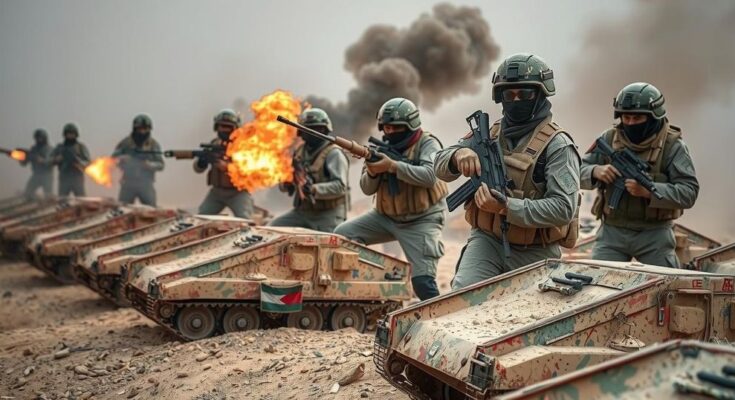The Syrian conflict has escalated following recent rebel offensives led by HTS against Bashar al-Assad’s regime amid regional unrest. Despite initial gains by the rebels, challenges persist for both sides, with significant international implications and calls for a political resolution to the enduring crisis.
The ongoing conflict in Syria has reignited amid broader turmoil in the Middle East following the Hamas attacks on Israel on October 7, 2022. This resurgence in violence has captivated attention, as rebel forces led by Hayat Tahrir al-Sham (HTS) have regained territory, significantly undermining the Assad regime’s control. Despite the apparent gains of these rebel factions, it would be premature to underestimate President Bashar al-Assad’s regime, which has historically demonstrated resilience and retains core support among certain segments of the Syrian population.
Since 2011, the Assad regime has relied heavily on crucial allies such as Russia, Iran, and Hezbollah to maintain its grip on power. However, with Iranian forces and their allies suffering setbacks due to Israeli actions supported by the United States, the landscape of the conflict has shifted dramatically. Russia’s military efforts are increasingly concentrated on its operations in Ukraine, leaving Assad’s regime potentially vulnerable despite its recent consolidation of power in major urban centers.
The recent offensive has revealed deep fractures within the Syrian landscape. HTS, although emerging from an al-Qaeda affiliation, is attempting to rebrand and present itself as a more moderate actor. This shift in strategy is intended to appeal to a wider audience in opposition to the Assad regime. As the offensive reportedly progresses toward Hama and beyond, the potential for further escalation remains high, raising concerns about the humanitarian impact on civilians trapped within the conflict.
While there are indications that rebel forces have secured valuable military assets, including aerial equipment, the regime and its allies are expected to retaliate with their aerial advantages. The international community, particularly through statements from the UN, emphasizes the urgency for a political resolution to the conflict, underscoring the failure to establish a meaningful political process conducive to peace. Resolution 2254, passed by the UN Security Council, aimed at democratizing Syria through free elections, has yet to materialize, highlighting the entrenched nature of the conflict.
The article examines the dynamics of the Syrian civil war, particularly focusing on the recent revival of rebel offensives against the Assad regime. Following a decade marked by brutal conflict starting in 2011, the geopolitical implications of the Middle Eastern turmoil, including the impact of the Hamas-Israel conflict, are pivotal. The article illustrates the complicated alliances and rivalries, the shifting agendas of various factions, the role of international stakeholders, and the humanitarian ramifications that underscore the ongoing crisis.
In conclusion, the resurgence of conflict in Syria as driven by rebel offensives highlights the fragility of the Assad regime amid shifting regional power dynamics. While the HTS’s recent gains may seem promising for opposition forces, the regime’s historical resilience and international backing may prevent a swift resolution. Without a genuine political process, the prospects for a sustainable peace remain bleak, necessitating an urgent reevaluation of strategies by both domestic and international actors in resolving this protracted conflict.
Original Source: www.bbc.co.uk




